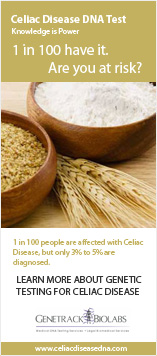How Is Celiac Disease Treated?

Find out if you are at risk - get tested
| TEST | TESTING TIME | PRICE |
|---|---|---|
| DNA Celiac Disease Test | 4 to 6 weeks | $249 USD |
Adhering to a Lifelong Gluten Free Diet
Although the underlying immune response to gluten cannot be cured, adhering to a lifelong gluten-free diet will promote healing of the intestinal villi and will ensure the disease symptoms do not reappear. The diet must avoid any foods, beverages and medications that contain wheat, barley, rye and possibly also oats. Even some lip balms may contain gluten. Assistance from a registered dietician who specializes in Celiac Disease and gluten-free diets is recommended since gluten is common in North American diets and avoiding all gluten sources can be challenging.
Other treatment may include supplementation of vitamins and minerals to correct any deficiencies. Short-term use of corticosteroids may be required to reduce severe inflammation or to aid in cases that do not respond to diet changes alone.
Prognosis
Once a gluten-free diet is initiated, the intestines will begin to heal. Children can expect to be symptom free within 3-6 months, but adults may require 2-3 years for healing to occur. It is possible that long-term damage can occur to the intestinal lining if there is a lengthy delay in diagnosis, but this is rare. Certain symptoms of Celiac Disease cannot be reversed, such as short stature from reduced growth rates or damage to teeth.
In rare cases, symptoms will still occur despite adherence to a gluten-free diet. This condition is known as refractory Celiac Disease and patients have severely damaged intestines that are not able to heal. These patients may require intravenous administration of nutrients since their intestines are not able to absorb enough nutrients on their own. Drug treatments for refractory Celiac Disease are still being evaluated.


